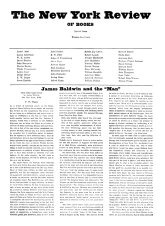Since many readers will be as pleased as this reviewer that Auden has put together a fat selection of his critical writings of recent years, and since it goes without saying that Auden’s opinions are important because they are his, I want to look into the curious fact that he does not really sound like a professional critic and perhaps is not one.
Perhaps he is too modest and too generous. These virtues shine again and again from these pages, and they are remarkable enough in one of the chief poets of the age, a man internationally celebrated now for thirty years, also a man known in his legend for a witty, savaging tongue, whereas here he several times refuses to exemplify a Bad Work on the ground that to do so would be “cruel.” But probably a critic must take the moral risk and be tougher, for it is his job, among other things, to assert and to judge: to propagate the faith and only the faith.
Worse still, he writes too well. His critical prose is not up to William Empson’s or Edmund Wilson’s, being even more informal than the one and less cunningly organized than the other; but that these names come up is tribute enough. (His imaginative prose, in The Orators, is brilliant.) He sounds like a man talking it out, while some very able modern critics sound like computers, or wasps, or mediums.
Then we have his engaging admission in the foreword that “I have never written a line of criticism except in response to a demand by others for a lecture, an introduction, a review, etc.; though I hope that some love went into their writing, I wrote them because I needed the money.” In short, he has no Program. He is not selling anything. Now a proper critic is as zealous as a young poet, crawling with ideas he burns to spread and enforce. (It is odd, by the way, that a poet so theoretical and programmatic as Auden—few poets in any time have created a whole moral landscape, as he did in the thirties—should go laissez-faire in his criticism.)
Finally, there is his reviewing practice. It is hardly unfair to say that Auden, over the years, has done one of two things with books entrusted to him for comment: either he wrote about what interested him at the moment, making some spidery connection with the book in hand, or, with books he felt keen about, like Cyril Connolly’s vivid Enemies of Promise, he quoted from them at agreeable length. Surely the pro sits on and breaks his brains.
So maybe Auden is not a professional critic. Splendid. He is a professional writer, of course, but in this corner an amateur—in the good sense of that sad word. He loves. He reports his love. Once, in a piece on Thomas Hardy not here reprinted (it was in The Southern Review), he observed that he was in love with Hardy. So are we all; but who else has said so?
The showpiece of the book is a study of the Master-Servant relation in literature, “Balaam and his Ass”: Quixote-Sancho, Lear-Fool, Giovanni-Leporello, others. For illustration of his interests and power, the opening sentence and a remark about The Tempest will do. “The relation between Master and Servant is not given by nature or fate but comes into being through an act of conscious volition.” “The Tempest seems to me a Manichean work, not because it shows the relation of Nature to Spirit as one of conflict and hostility, which in fallen man it is, but because it puts the blame for this upon Nature and makes the Spirit innocent.” The abstractions that have plagued Auden through some of his later poetry are around, but make out better.
In a book so titled, there is less Shakespearean criticism than one would have expected. Falstaff, Shylock, Iago are tossed about and viewed. Some of the views will strike fear into conservative hearts. “The essential Falstaff is the Falstaff of The Merry Wives and Verdi’s opera….” On the acting of Iago: “With others, he must display every virtuoso trick of dramatic acting…. When he is alone, on the other hand, the actor must display every technical fault for which bad actors are criticized…. He must deliver the lines of his soliloquies in such a way that he makes nonsense of them.” It may be a considerable time before this theatrical ideal is realized. Auden is playful. One of his plays here is the well-known essay on detective stories (“The Guilty Vicarage”). About D. H. Lawrence, Byron’s Don Juan, and, less predictably, Ibsen, he is very serious. He moves easily back and forth across the Atlantic. Marianne Moore, with her animals, is paired with Lawrence, with his, in what I would agree is his most satisfying book of poems (Birds, Beasts and Flowers). One of Auden’s rare jabs is delightful: he quotes Yeats’s anthology-piece “The Scholars” and calls it “rather silly.”
Advertisement
But much of all this is familiar to some readers in this country already. New to most of us must be his inaugural lecture at Oxford in 1956. Of many passages deserving citation, I take this:
Speaking for myself, the questions which interest me most when reading a poem are two. The first is technical: “Here is a verbal contraption. How does it work?” The second is, in the broadest sense, moral: “What kind of a guy inhabits this poem? What is his notion of the good life or the good place? His notion of the Evil One? What does he conceal from the reader? What does he conceal even from himself?”
The modesty, the casualness, the fake-American, the Henry James, the theology, the depth-psychology, are all charmingly characteristic. Also it puts swiftly, with involuntary authority, to a good teacher, the way he has been working; or to a good reader.
This Issue
February 1, 1963



